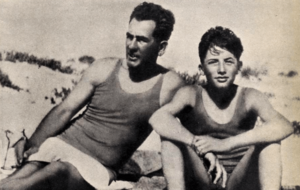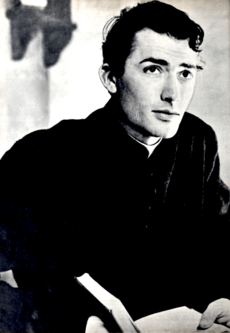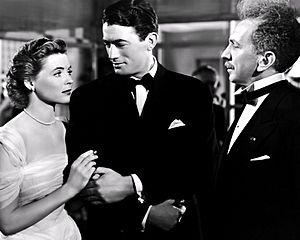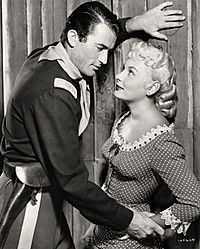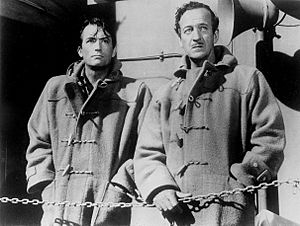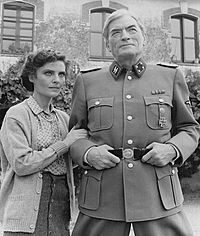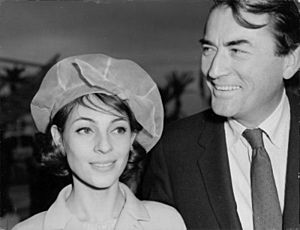Gregory Peck facts for kids
Quick facts for kids
Gregory Peck
|
|
|---|---|
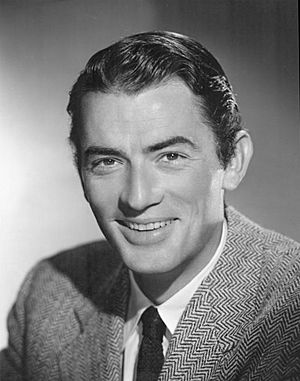
Peck in 1948
|
|
| Born |
Eldred Gregory Peck
April 5, 1916 San Diego, California, U.S.
|
| Died | June 12, 2003 (aged 87) Los Angeles, California, U.S.
|
| Resting place | Cathedral of Our Lady of the Angels, Los Angeles |
| Alma mater |
|
| Occupation | Actor |
| Years active | 1941–2000 |
| Political party | Democratic |
| Spouse(s) |
Greta Kukkonen
(m. 1942–1955)Veronique Passani
(m. 1955) |
| Children | 5, including Cecilia Peck |
| Relatives | Ethan Peck (grandson) |
Eldred Gregory Peck (born April 5, 1916 – died June 12, 2003) was a famous American actor. He was one of the most popular movie stars from the 1940s to the 1970s. In 1999, the American Film Institute called Peck the 12th greatest male star of Classic Hollywood Cinema.
Gregory Peck started acting on stage, appearing in over 50 plays. He became well-known for his role in The Keys of the Kingdom (1944). This movie earned him his first Academy Award nomination. He then starred in many successful films. These included the romantic drama The Valley of Decision (1944) and Alfred Hitchcock's thriller Spellbound (1945). He also appeared in the family film The Yearling (1946).
In the 1950s and 1960s, Peck became famous worldwide. He starred in Captain Horatio Hornblower (1951) and the biblical drama David and Bathsheba (1951). He acted with Ava Gardner in The Snows of Kilimanjaro (1952). He also starred with Audrey Hepburn in Roman Holiday (1953). This role won him a Golden Globe award.
Other important films he appeared in include Moby Dick (1956) and The Guns of Navarone (1961). He also starred in Cape Fear (1962) and The Omen (1976). Throughout his career, he often played good characters with strong morals. For example, Gentleman's Agreement (1947) was about fighting against antisemitism.
Peck won an Academy Award for Best Actor for his role as Atticus Finch in To Kill a Mockingbird (1962). This movie was about racial inequality. In 1983, he played Hugh O'Flaherty, a Catholic priest who saved thousands of people during World War II.
Peck was also involved in politics. He spoke out against unfair investigations in Hollywood in 1947. President Lyndon B. Johnson gave Peck the Presidential Medal of Freedom in 1969. This was for his work helping others. Gregory Peck passed away peacefully in his sleep at age 87.
Contents
Early Life and Education
Eldred Gregory Peck was born on April 5, 1916, in La Jolla, San Diego, California. His parents were Bernice Mae Ayres and Gregory Pearl Peck. His father was a chemist and pharmacist. Gregory was raised Catholic, like his father. His grandmother was related to Thomas Ashe, an Irish hero.
Peck's parents divorced when he was five years old. His maternal grandmother raised him. She took him to the movies every week. When he was 10, he went to a Catholic military school in Los Angeles. His grandmother died while he was there. At 14, he moved back to San Diego to live with his father.
He went to San Diego High School. After graduating in 1934, he attended San Diego State Teacher's College (now San Diego State University). There, he joined the track team and took his first acting classes. Peck wanted to be a doctor. He later transferred to the University of California, Berkeley. He studied English and pre-medicine. He was very tall, about 6 feet 3 inches. He also rowed on the university team. He worked as a kitchen helper to pay for his meals.
At Berkeley, Peck's deep voice got him noticed. After taking a public speaking class, he decided to try acting. An acting coach encouraged him. He became very interested in theater. He appeared in five plays during his last year, including Moby Dick. Peck later said his years at Berkeley were "very special" and "made me a human being." In 1996, he gave $25,000 to the Berkeley rowing team to honor his coach.
Acting Career
Early Stage Roles (1939–1943)
Peck did not finish college with his friends. He moved to New York City to study acting at the Neighborhood Playhouse. He was often short on money. He sometimes slept in Central Park. He worked at the 1939 World's Fair and as a tour guide.
His stage career began in 1941. He appeared in a play called The Doctor's Dilemma. He made his Broadway debut in The Morning Star in 1942. Peck was in high demand during World War II. This was because he was excused from military service due to a back injury. He had hurt his back during dance lessons. He performed in about 50 plays.
Becoming a Star (1944–1946)
After his stage success, Peck got his first movie role. It was in the war-romance Days of Glory (1944). He played the leader of Russian fighters. Peck felt his acting in this film was not very good. The movie did not do well.
However, Peck's talent was clear. He decided to work as a freelancer, choosing his own roles. He signed contracts with four different studios.
Peck's second movie was The Keys of the Kingdom (1944). He played an 80-year-old priest who was a missionary in China. He was in almost every scene. The film was nominated for four Academy Awards, including Best Actor for Peck. This movie made him a star.
In The Valley of Decision (1944), Peck played the son of a rich steel mill owner. He fell in love with one of his family's maids. This movie was the highest-earning film of 1945 in North America.
Peck then worked with director Alfred Hitchcock in Spellbound (1945). He starred with Ingrid Bergman. Peck played a man who might be a murderer. The movie was a big hit. Critics liked Peck's performance.
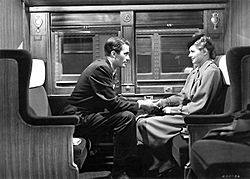
In The Yearling (1946), Peck played a kind father. His son finds a baby deer and wants to raise it. The movie was a success and was nominated for six Academy Awards. Peck won a Golden Globe Award for his acting. It is still seen as one of the best family films.
Peck took a different kind of role in Duel in the Sun (1946). He played a mean cowboy. This film was very popular, earning a lot of money.
Important Films (1947–1949)
In 1947, Peck helped start La Jolla Playhouse in his hometown. This theater company gave Hollywood stars a chance to perform on stage.
Peck's next film was Gentleman's Agreement (1947). It was directed by Elia Kazan. This movie was important because it was one of the first Hollywood films to openly talk about antisemitism. Peck played a writer who pretended to be Jewish to understand prejudice. The film won Best Picture at the Academy Awards. Peck was very proud of this movie.
His next films, The Paradine Case (1947) and The Great Sinner (1949), were not as successful. However, he became good friends with his co-star Ava Gardner during The Great Sinner.
In 1949, Peck starred in Twelve O'Clock High. He played a U.S. World War II bomber commander. His character had to deal with a lot of stress. This movie was a commercial success. Critics praised Peck's performance. Many people consider this one of his most memorable roles.
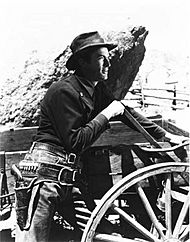
Global Recognition (1950–1953)
Peck started the 1950s with two Westerns. The first was The Gunfighter (1950). Peck played an aging gunfighter who wanted to retire. The studio was worried about Peck's mustache in the film, but it is now seen as a classic Western.
His next Western was Only the Valiant (1951). Peck did not like the script for this movie. It was a lower-budget film.
Peck then starred in Captain Horatio Hornblower (1951). He played a British warship commander during the Napoleonic Wars. The movie was a box office hit. Critics generally liked Peck's performance.
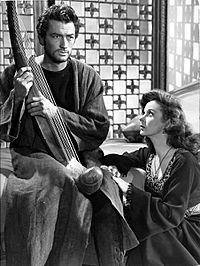
His third film with director Henry King was David and Bathsheba (1951). This biblical movie was the highest-earning film of 1951. These two successful movies made Peck a huge Hollywood star.
In 1952, Peck was in The World in His Arms. He played a seal-hunting ship captain. He also reunited with Henry King and Ava Gardner in The Snows of Kilimanjaro (1952). Peck played a writer looking back on his life. This film was also a big box office success.
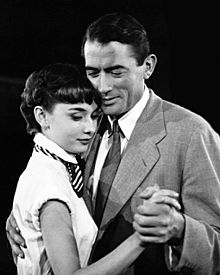
Peck's first comedy role was in Roman Holiday (1953). He played an American journalist with Audrey Hepburn as a European princess. Peck insisted that Hepburn's name be placed above the title in the credits. He knew she would become a big star. The film was very successful. Critics loved Peck's performance. Hepburn won an Academy Award for Best Actress for her role.
Later Success (1954–1964)
Peck spent about 18 months in the United Kingdom from 1953 to 1955. This was due to tax laws. His next three films were shot in London, Germany, and Southeast Asia. He starred in The Million Pound Note (1954), a comedy. He played a poor American given a one million pound note.
He then played a US army colonel in Night People (1954). Peck liked this role because his character was "tough and crisp." He also filmed The Purple Plain (1954) in Sri Lanka. He played a Canadian bomber pilot with emotional problems. This movie was a hit in the UK.
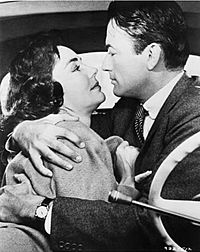
In 1956, Peck starred in The Man in the Gray Flannel Suit. He played an ex-soldier haunted by his past. The movie was successful.
Peck then played Captain Ahab in the 1956 film Moby Dick. He was unsure about the role, but director John Huston convinced him. Filming was difficult, and Peck almost drowned. The movie was popular but cost a lot to make.
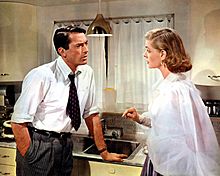
For the romantic comedy Designing Woman (1957), Peck chose Lauren Bacall as his co-star. The film was moderately successful.
Peck's first film of 1961 was The Guns of Navarone. This World War II drama showed Peck leading a team to destroy German guns. The film was the highest-earning movie of 1961. It was nominated for seven Academy Awards. It won for Best Special Effects.
Peck's next film was Cape Fear (1962). He played a lawyer whose family is threatened by a man he helped put in prison.
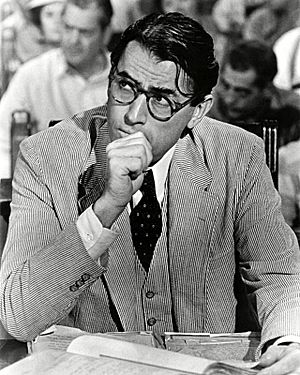
Peck's most famous role was in To Kill a Mockingbird (1962). He played Atticus Finch, a kind and honest lawyer. He won the Academy Award for Best Actor for this role. The film was a huge success. In 2003, Atticus Finch was named the greatest film hero of the past 100 years by the American Film Institute. Peck said this was his favorite film.
Later Career (1965–2000)
Peck was very active in the film industry. He served as president of the Academy of Motion Picture Arts and Sciences. He was also chairman of the American Film Institute.
Peck sometimes played villain roles. These included a Nazi doctor in The Boys from Brazil. In the 1980s, Peck moved to television. He played Abraham Lincoln in a mini-series. He also starred in The Scarlet and The Black (1983). In this TV film, he played a Catholic priest who saved Jewish people during World War II.
Peck, along with Robert Mitchum, appeared in the 1991 remake of Cape Fear. Peck played the villain's lawyer in this version. His last major film role was in Other People's Money (1991). He played a business owner trying to save his company.
After this, Peck mostly retired from acting. He spent his last years giving talks around the world. He showed clips from his movies and answered questions. He came out of retirement for a 1998 mini-series version of Moby Dick. He played Father Mapple in this version. This was his final performance. It won him a Golden Globe Award.
Politics and Activism
Gregory Peck was a lifelong Democrat. In 1947, he signed a letter against an investigation into alleged communists in Hollywood. He was known for his liberal views. President Richard Nixon even put Peck on his "enemies list."
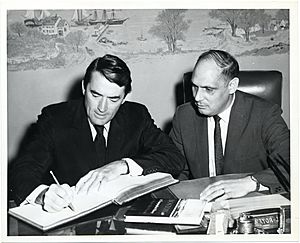
President Lyndon B. Johnson once told Peck he wanted to make him the U.S. ambassador to Ireland. Peck said he might have taken the job. In 1969, Johnson gave Peck the Presidential Medal of Freedom. This is the highest award for civilians in the U.S.
Peck spoke out against the Vietnam War. In 1972, he produced a film about Vietnam War protesters. He also played American general Douglas MacArthur in a 1976 film. Peck was a close friend of French president Jacques Chirac.
In 1987, Peck did voice-overs for commercials against President Ronald Reagan's Supreme Court judge nomination. He was also a strong supporter of banning nuclear weapons. He also believed in gun control.
Personal Life
In October 1942, Gregory Peck married Greta Kukkonen. They had three sons: Jonathan, Stephen, and Carey Paul. They divorced in December 1955.
On New Year's Eve in 1955, Peck married Véronique Passani. She was a news reporter from Paris. They had a son, Anthony, and a daughter, Cecilia Peck. They stayed married until Gregory Peck's death. One of his grandsons is actor Ethan Peck.
Peck owned thoroughbred steeplechase race horses. His horse, Different Class, finished third in the 1968 Grand National race.
Peck was Roman Catholic. He once thought about becoming a priest. He helped raise money for a priest friend's missionary work. He also co-produced a recording of the New Testament.
Death and Legacy
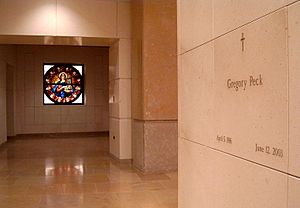
Gregory Peck died in his sleep on June 12, 2003. He was 87 years old. He passed away at his home in Los Angeles. His wife, Veronique, was with him.
Gregory Peck is buried in the Cathedral of Our Lady of the Angels in Los Angeles. His funeral was attended by many famous people.
The Gregory Peck Award for Cinematic Excellence was created in 2008. It honors directors, producers, or actors for their life's work. It is now presented at the San Diego International Film Festival. Past winners include Laura Dern and Patrick Stewart.
Acting Credits and Awards
Some of Gregory Peck's most important films include The Keys of the Kingdom (1945), Spellbound (1945), The Yearling (1946), and Gentleman's Agreement (1947). Other notable works are Twelve O'Clock High (1949), The Gunfighter (1950), Roman Holiday (1953), Moby Dick (1956), The Guns of Navarone (1961), and To Kill a Mockingbird (1962).
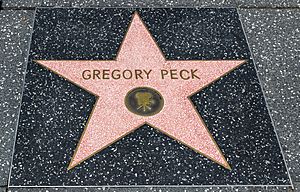
Peck was nominated for five Academy Awards. He won Best Actor for To Kill a Mockingbird (1962). In 1967, he received the Jean Hersholt Humanitarian Award. He also won several Golden Globe Awards. These included two for Best Actor and one for Best Supporting Actor for the 1998 Moby Dick mini-series. He received the Cecil B. DeMille Award in 1969.
In 1969, President Lyndon B. Johnson gave Peck the Presidential Medal of Freedom. In 1998, President Bill Clinton gave him the National Medal of Arts. He also received the AFI Life Achievement Award and the Screen Actors Guild Life Achievement Award. Gregory Peck has a star on the Hollywood Walk of Fame at 6100 Hollywood Boulevard.
Archives
Peck gave his personal collection of home movies and film prints to the Film Archive of the Academy of Motion Picture Arts and Sciences in 1999.
See also
 In Spanish: Gregory Peck para niños
In Spanish: Gregory Peck para niños
- List of Gregory Peck performances
- List of Presidential Medal of Freedom recipients
 | Selma Burke |
 | Pauline Powell Burns |
 | Frederick J. Brown |
 | Robert Blackburn |


